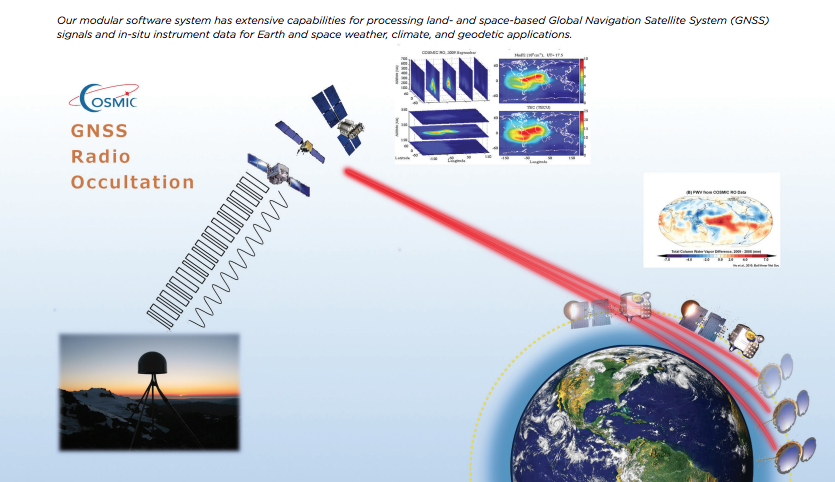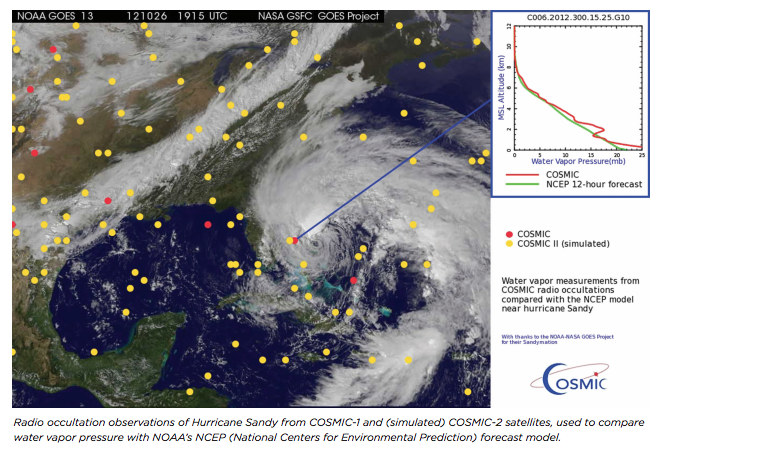SatDAAC™
SCIENTIFIC DATA PROCESSING SOFTWARE
|
|
Intro
SatDAAC (Satellite Data Analysis and Archive
Center) is a sophisticated software package
that automatically processes and analyzes
data from terrestrial and space-based instruments
for near real-time and post-processing
science applications.
The package provides a complete, end-to-end
solution for managing scientific data, focusing
on remote sensing of the atmosphere for
weather, climate, space weather, and other
applications. Its flexible, modular design also
enables organizations to develop and run their
own application software within the processing
system, or to use the system to process their
own data.
|

|

|
Background
The University Corporation for Atmospheric
Research has over 20 years of experience in
processing data for weather, climate, and geodetic
science applications. The research, development, and
processing are managed by the COSMIC Program
(Constellation Observing System for Meteorology,
Ionosphere, and Climate), which is housed at UCAR.
The data and products are provided to more than
3,300 users in 90 countries, including the National
Oceanic and Atmospheric Administration's National
Weather Service, NOAA's Space Weather Prediction
Center, and the U.S. Air Force 557th Weather Wing.
|
|
Capabilities
- Automated processing of Global Navigation
Satellite System (GNSS) data collected on the
ground or by satellites in low Earth orbit
- Automated radio occultation (RO) retrievals.
This technique produces data about
pressure, temperature, and humidity, as
well as ionospheric activity, based on the
bending of radio waves as they traverse
the atmosphere.
- Automated estimates of atmospheric
conditions from ground- and space-based
sensors
- Automated satellite data retrieval via Earth
downlink stations
- Quality control monitoring and data
comparison, including automated report
generation, web-based monitor displays,
and alerting in case of anomalies
- A modular framework that enables a user
to incorporate or "plug in" new sensors and
processing algorithms.
- Management of instrument positions, spacecraft
status, and data downlink scheduling
- Data archiving
|
UCAR In-House Capabilities:
- Redundant, geographically separated data
processing centers with dual connections to
the power grid and internet backbone
24x7 network operations center
Processing clusters for high volume
data applications
Data archive
FISMA moderate compliant IT segment
|

|
|
Applications And Uses
SatDAAC has a number of potential applications and
uses for the research, academic, and commercial
sectors, including:
-
Improving weather forecasts and analyses,
especially over data-sparse regions such as
the oceans, tropics, and poles
-
Improving the understanding of tropical,
midlatitude, and polar weather systems and
their interactions
-
Calibrating and validating other instruments
-
Improving space weather prediction and analysis
-
Monitoring variability and change in climate
indicators such as temperature and water vapor
with unprecedented accuracy
-
Improving evaluation of global climate models
-
Improving the monitoring and prediction of such
atmospheric phenomena as equatorial plasma
bubbles, which can degrade GNSS performance,
and sporadic E clouds, which can disrupt local
radio signals
|
Support
UCAR's scientific and engineering expertise
supports SatDAAC in the following areas:
- Data assimilation for numerical weather
prediction and space weather applications
- Instrument calibration
- Satellite ground station development,
procurement, and installation
- Precise GNSS receiver positioning
- Satellite payload systems engineering,
integration, and testing
- Radio wave modeling
- Online and in-person user training
|
|
CONTACTS
For more information about capabilities and licensing,
please contact:
COSMIC Program,
University Corporation for Atmospheric Research
303-497-2603 | cosmicsw@ucar.edu
The University Corporation for Atmospheric Research is
a nonprofit consortium of more than 100 colleges and
universities focused on research and training in the
atmospheric and related Earth system sciences. UCAR
manages the National Center for Atmospheric Research
with sponsorship by the National Science Foundation.

|
|
|
|